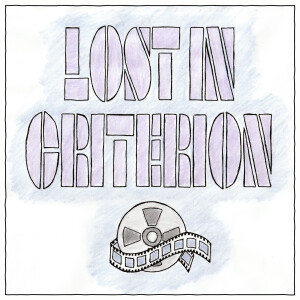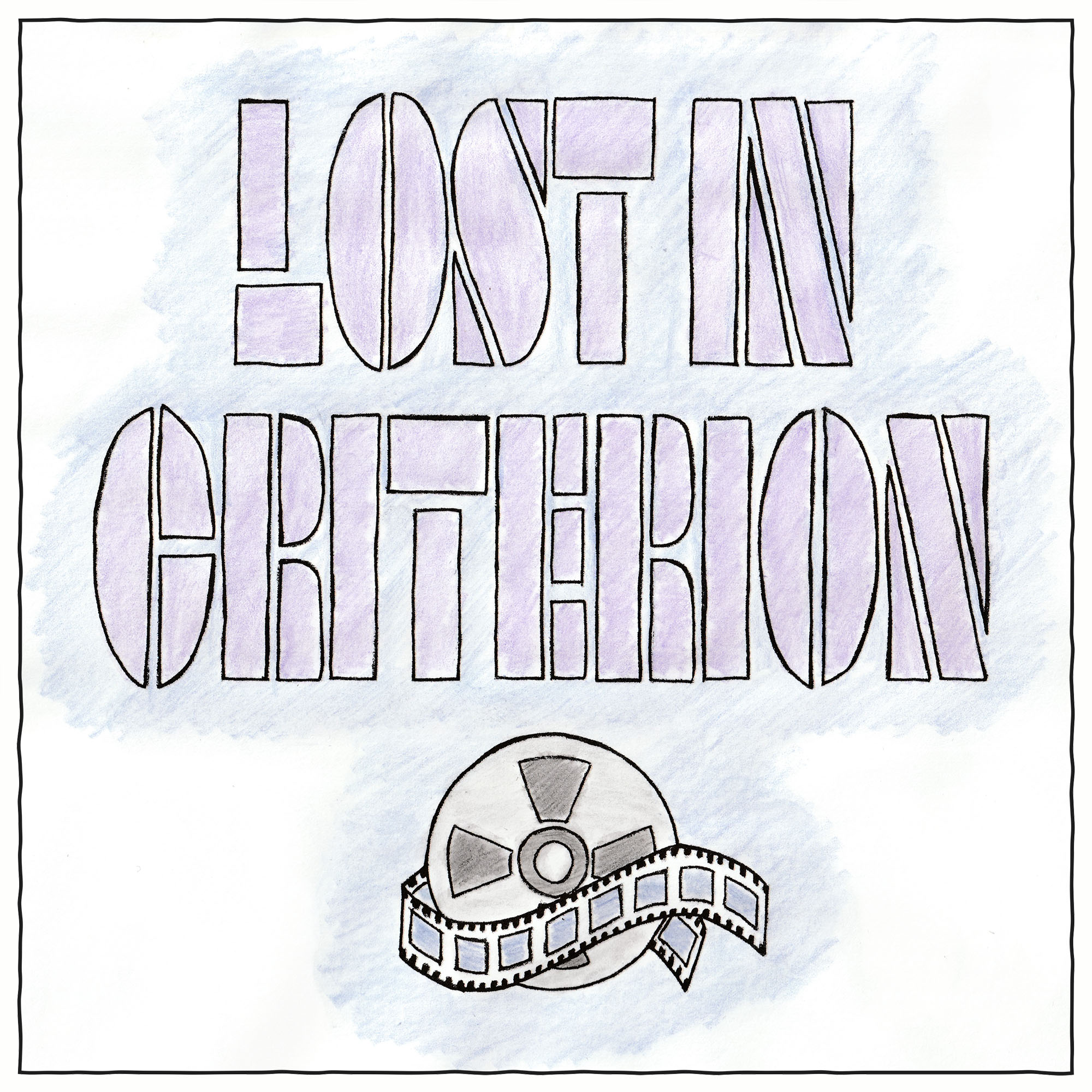Episodes

Friday Nov 03, 2017
Spine 265: Short Cuts
Friday Nov 03, 2017
Friday Nov 03, 2017
Robert Altman adapts nine Raymond Carver short stories and a poem into a huge ensemble drama that, if about anything at all, seems to be a condemnation of toxic masculinity on par with Catherine Breillet's Fat Girl. It's got a lot going on, and Altman's decision to transport all the narratives to LA and interconnect them both helps and harms. Ultimately, fidelity to the source material isn't the point, and can't be -- as we discuss in regards to the portions based on "So Much Water So Close to Home" short stories are, by their nature, doing different things than film scenes -- but Carver's spirit still exists here. At least as far as we can tell, as neither Pat nor Adam have read any Carver.

Friday Oct 27, 2017
Spine 264: The Making of Fanny and Alexander
Friday Oct 27, 2017
Friday Oct 27, 2017
After spending something like 12 hours on variations of the same material we finally finish the Fanny and Alexander boxset with The Making of Fanny and Alexander a behind the scenes film of Ingmar Bergman's Fanny and Alexander directed by Bergman himself. While we've peaked behind the Swede's curtain before with Sjoman's peak at Winter Light's creation in Ingmar Bergman Makes a Movie, this one seems more true to life, with a Bergman who knows what he wants but is still willing to trust his collaborators (sometimes) all while acting as a film-making grandfather in so many ways.

Friday Oct 20, 2017
Spine 263: Fanny and Alexander, the theatrical cut
Friday Oct 20, 2017
Friday Oct 20, 2017
Technically released first, but planned second, the theatrical cut of Ingmar Bergman's Fanny and Alexander removes over 2 hours of material that, while perhaps non-essential, helps make the longer cut the better version. Three hours and eight minutes is still pretty h*ckin' long for a theatrical film, though it turns out there was a Swedish theatrical release of the full 312 minute "television cut" as one movie in 1983. I think that's probably a bad idea, too. Consume it as the four television episodes over the course of a few nights and you have a much more manageable and enjoyable experience.
This is part two of our discussion of Fanny and Alexander, following last week's discussion of the television cut.

Friday Oct 13, 2017
Spine 262: Fanny and Alexander, the television cut.
Friday Oct 13, 2017
Friday Oct 13, 2017
Contrary to what Adam says toward the beginning of this week's episode, Ingmar Bergman's Fanny and Alexander was not first released in a 312 minute cut. The long cut was planned first, but the first release was the shorter 188 minute version in 1982, which we'll talk more about next week. Still this longer version was actually released to theaters in December of 1983 before being chopped into four episodes for Swedish television a bit later.
This is part one of our discussion, one because there's just too much Fanny and Alexander for one episode, an two because its impossible to talk about the shorter cut without talking about the longer, better cut. We'll see you next week for part two, which focuses more on the theatrical version of the film.

Friday Oct 06, 2017
Spine 260: Eyes Without a Face
Friday Oct 06, 2017
Friday Oct 06, 2017
It's October so let's watch a classic horror film! (As if this was planned and not just a quirk in the randomness of the way the Criterion Collection presents films to us.)
Georges Franju was asked by producer Jules Borkon to make a British/American style horror film for a French audience, but one that didn't torture animals, have too much blood, or a mad scientist. So he made a film about a mad scientist who experiments on dogs and does a whole face transplant on screen.
Franju did so well emulating foreign horror that Eyes Without a Face was wholly disowned by the French film establishment. It's just that amazing.

Friday Sep 29, 2017
Spine 259: Fat Girl
Friday Sep 29, 2017
Friday Sep 29, 2017
Fat Girl is an unfortunately named coming of age story film that Catherine Breillat made in 2001 which led me to a greater understanding (though probably still not appreciation) of Liliana Cavani's The Night Porter which we discussed three and a half years ago. We're growing!
The film itself plays with similar, if much less Nazi-exploitative, themes to Cavani's work, speaking to the inherent violence of male-dominated sexual relationships. And it's ending! Oh goodness, the ending.

Friday Sep 22, 2017
Spine 258: Tanner '88
Friday Sep 22, 2017
Friday Sep 22, 2017
Robert Altman gets political again, but in a very different manner to last week's delightfully ranty satire. Instead we have a miniseries set against the 1988 Presidential race that may have been satirical in 1988, but we've gone through the looking glass as of late and instead it's just inside baseball. Which doesn't make it any less funny when it's funny, or poignant when it's poignant -- or exploitative when it's exploitative. Tanner '88, written by Doonesbury creator Garry Trudeau, tells the story of a failed campaign in a ripped-from-the-headlines manner involving real political players interacting with Altman's fakes over the course of 11 episodes that are incredibly uneven individually, but pretty great as a whole.

Friday Sep 15, 2017
Spine 257: Secret Honor
Friday Sep 15, 2017
Friday Sep 15, 2017
A clearly disturbed and vile president rants about the conspiracies against him while contemplating suicide, and somehow is so full of pathos that we find ourselves feeling pity instead of anger.
There are...modern parallels? Robert Altman's Secret Honor's exploration of Nixon's psyche is a class of its own, due mostly to Philip Baker Hall's masterful performance. Still it does remind us of certain contemporary pieces, namely the first episode of Comedy Central's The President Show (particularly starting at about the 5 minute mark), and Aimee Mann's brilliantly tragic entry for 30 Days 30 Songs "Can't You Tell?".

Friday Sep 08, 2017
Spine 256: A Constant Forge
Friday Sep 08, 2017
Friday Sep 08, 2017
We properly finish the Five Films box set with Charles Kiselyak's 2000 video eulogy to John Cassavettes. A Constant Forge finds Cassevettes' friends and creative squad telling anecdotes about the man and his process. The biggest lesson: we've been pronouncing Gena Rowlands' name wrong for the past month.

Saturday Sep 02, 2017
Spine 255: Opening Night
Saturday Sep 02, 2017
Saturday Sep 02, 2017
Gena Rowlands is on an absolute tour de force in this final film in the John Cassavetes: Five Films boxset. Well, technically there's a six we'll talk about next week, but you know. Opening Night (1977) is a psychological drama about a middle-aged actress having a nervous breakdown as she prepares for a show, and it borders on being a horror film the way it is shot and soundtracked.

Saturday Aug 26, 2017
Spine 254: The Killing of a Chinese Bookie
Saturday Aug 26, 2017
Saturday Aug 26, 2017
Two films for the price of one this week as we watch the original 135 minute version of John Cassavetes' The Killing of a Chinese Bookie from 1976 and then his director's cut which runs 108 minutes from 1978. Of course, since this is Cassavetes, the shorter version isn't just a truncated version but a rather different film in design, in character motivation, and quite a bit of plot. Right from the start we see scenes not in the longer original then a restructuring of the narrative's chronology. The pair form a fascinating look into the psyche of an extraordinary director, only compounded by the suggestion that the story is allegorically autobiographical.

Saturday Aug 19, 2017
Spine 253: A Woman Under the Influence
Saturday Aug 19, 2017
Saturday Aug 19, 2017
There are ways in which A Woman Under the Influence is the most "Hollywood" of the John Cassavetes films we've seen so far. It's got structure! But in other very deep ways it is absolutely the furthest from anything Hollywood would ever put out -- "No one wants to see a crazy, middle-aged dame." It's quite possibly the most emotionally intense film we've ever seen.

Friday Aug 11, 2017
Spine 252: Faces
Friday Aug 11, 2017
Friday Aug 11, 2017
Another John Cassavetes film that feels more like an acting exercise than a traditional film. Not that there's anything wrong with that. Like last week's film Shadows, Faces feels improvised (and grew out of improvisation exercises) and it feels all the more real for its looseness.

Friday Aug 04, 2017
Spine 251: Shadows
Friday Aug 04, 2017
Friday Aug 04, 2017
We kick off a box set of Five Films by John Cassavetes this week with his first feature Shadows (1959). It was a bit of a rough start for the prolific indie auteur who recut the film after a disastrous premiere before leaving the original cut in a subway car. What remains is a fascinatingly realistic look at New Yorkers in the late 50's.

Saturday Jul 29, 2017
Spine 249: The Battle of Algiers
Saturday Jul 29, 2017
Saturday Jul 29, 2017
In 2003 the US Department of Defense held a screening of Gillo Pontocorvo's 1966 film The Battle of Algiers at the Pentagon. A flyer for the screening read:
How to win a battle against terrorism and lose the war of ideas. Children shoot soldiers at point-blank range. Women plant bombs in cafes. Soon the entire Arab population builds to a mad fervor. Sound familiar? The French have a plan. It succeeds tactically, but fails strategically. To understand why, come to a rare showing of this film.
Subsequent US history tells us that the showing did not achieve its objectives.

Friday Jul 21, 2017
Spine 248: Videodrome
Friday Jul 21, 2017
Friday Jul 21, 2017
There's an early iTunes review of Lost in Criterion that states that Pat says "weird" a distractingly large number of times for lack of a better way to describe things. This week the two of use do the same thing but with the word "orifice". If there is any director who comes to mind with the word "orifice" it's definitely David Cronenberg, and in 1983 he was at his most-orifice-y with Videodrome, a film that accurately predicted the future of James Woods.

Friday Jul 14, 2017
Spine 247: Slacker
Friday Jul 14, 2017
Friday Jul 14, 2017
Richard Linklater's Slacker kicked off the American indie scene of the 90's for better or worse (Kevin Smith cites the film as inspiration for making Clerks). Criterion dates the release as 1991 which is when it won at Sundance, though it floated around for at least a year before that, premiering in Austin in June of 1990 and having principally been shot in 1989. There's a lot here that under other circumstances I'd hate, mainly all the people spouting bad philosophy less toward other characters and more toward the camera, but you know what? It works here. It works beautifully.

Friday Jul 07, 2017
Spine 246: I Vitelloni
Friday Jul 07, 2017
Friday Jul 07, 2017
The Criterion website describes Federico Fellini's I Vitelloni as "semi-autobiographical" which is a valid description of any Fellini film. The man couldn't make a movie that wasn't ultimately about himself. I suppose upon its release in 1953, with only two other films under his belt, it is perhaps the most autobiographical Fellini has been thus far, but both earlier films clearly have elements of Fellini's life woven in. As far as I Vitelloni goes, it's pretty clear who Fellini thinks his author-insert is, but it's also pretty clear which who it actually is.

Friday Jun 30, 2017
Spine 245: Port of Shadows
Friday Jun 30, 2017
Friday Jun 30, 2017
Marcel Carne's Port of Shadows, released in 1938, is the one of the earliest films to have the term "film noir" applied to it. It also stars our favorite face of French Poetic Realism Jean Gabin. This is our second outing with Carne after his 1945 epic Children of Paradise. There is significantly less mime in this one.

Friday Jun 23, 2017
Spine 244: Elena and Her Men
Friday Jun 23, 2017
Friday Jun 23, 2017
So producer Louis Wipf says to Jean Renoir, "Hey, Jean Renoir, you wanna make a movie with Ingrid Bergman?"
And Jean Renoir says, "Boy do I!"
Then he sat around for a bit and tried out a few ideas that either he or Wipf or Bergman didn't really like before settling on a fictionalized version of the life of General Georges Boulanger, though not fictionalized enough that Bergman was playing the general.
Anyway, Elena and Her Men (1956) brings the Stage and Spectacle boxset to a close with little stage but a whole lot of spectacle, and is our favorite of the three.

Saturday Jun 17, 2017
Spine 243: French Cancan
Saturday Jun 17, 2017
Saturday Jun 17, 2017
We continue the Stage and Spectacle boxset with 1954's French Cancan wherein Jean Renoir explores the founding of the Moulin Rouge with about as much fidelity to history as Baz Luhrmann. But more interesting than the pseudo-history is the visual panache, with frequent frame references to the works of Renoir's father and his fellow impressionists. Visually stunning to say the least. And perhaps the most.

Friday Jun 09, 2017
Spine 242: The Golden Coach
Friday Jun 09, 2017
Friday Jun 09, 2017
Now we jump 13 years into Renoir's future from the last film of his we saw (The Lower Depths) and find him working in color and out from under the pressures of an impending war (and a bit of an exile to Hollywood) for a trilogy of films dancing around themes of theater and female-empowerment. Well, kind of.
First off from Stage and Spectacle: Three Films by Jean Renoir is 1953's The Golden Coach and boy is it a change from the Renoir we've grown accustomed to.

Saturday Jun 03, 2017
Spine 240: Early Summer
Saturday Jun 03, 2017
Saturday Jun 03, 2017
We're slowly working our way backwards through Ozu's Noriko trilogy and it's amazing.

Saturday May 27, 2017
Spine 239: The Lower Depths
Saturday May 27, 2017
Saturday May 27, 2017
Two movies for the price of one with this week's outing. In 1902 Maxim Gorky debuted his play The Lower Depths about a group of people living in a flophouse in Russia. It was an international hit of a character study, leading to localizations around the world. In 1957 Akira Kurosawa made a version that was fairly faithful to the source material except transported to 19th century Japan. In 1936 Jean Renoir made it into a romantic comedy.
Reportedly, Gorky actually liked Renoir's version, but even Renoir recognized that Kurosawa made the better adaptation. They're both wonderful movies and are both included in the Criterion Collection's The Lower Depths double disc.

Friday May 19, 2017
Spine 238: A Woman is a Woman
Friday May 19, 2017
Friday May 19, 2017
Godard's ode to Lubitsch isn'y quite as eye-rolly as the title suggests.

